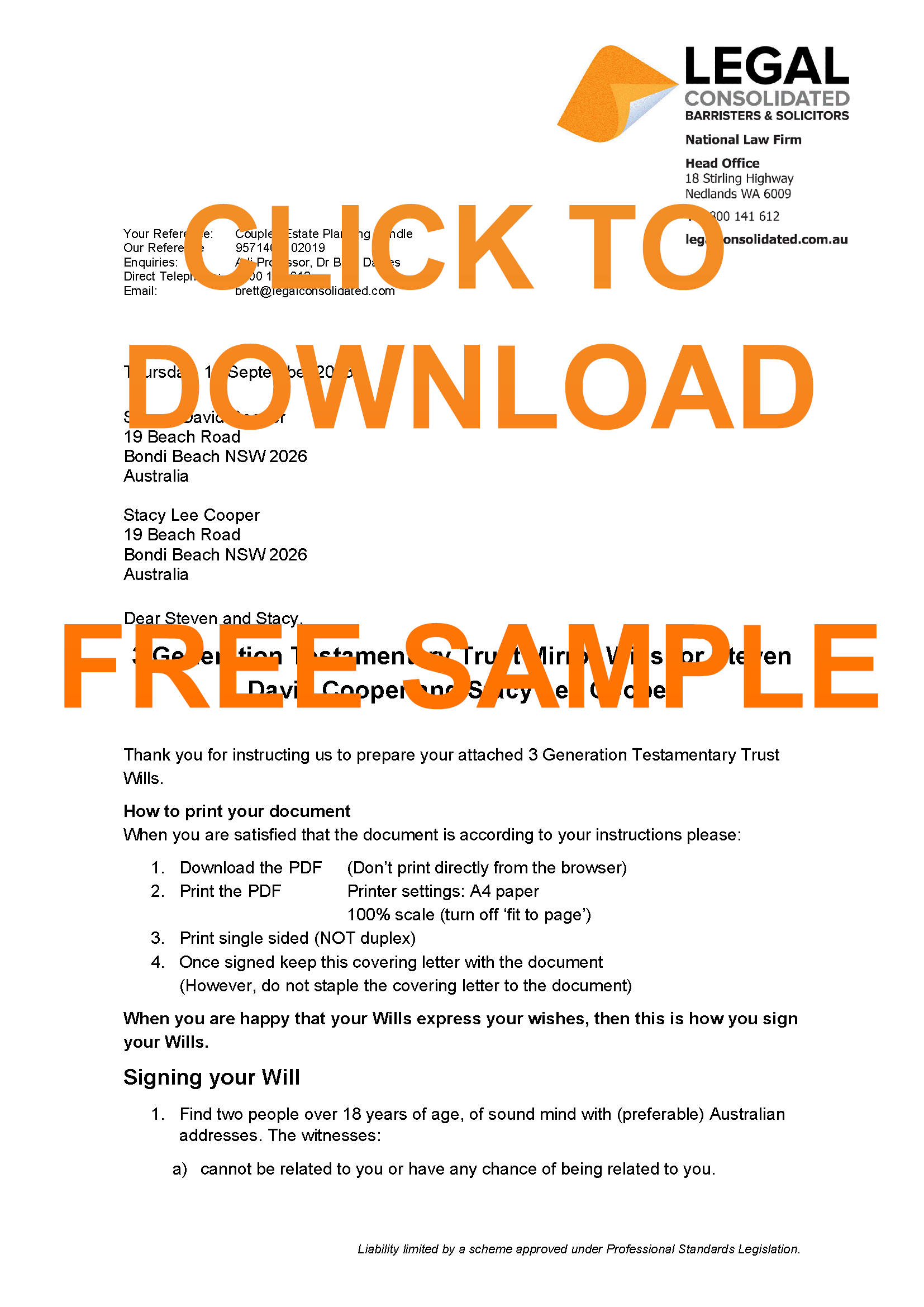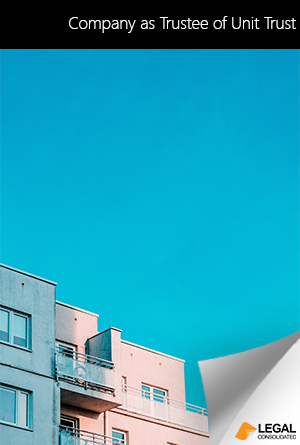
Company as Trustee of Unit Trust
$1,075 includes GST
-
Designed to be the trustee of a Unit Trust. Includes:
• ASIC fee, ASIC Certificate and ACN
• Constitution: Div7A Loan, 30 share classes, electronic secretary file and Share certificates
• Company Officer registers, minutes and consents
• we oversee & meet with ASIC, as required
Incorporate a new company as trustee of your Unit Trust
A company as trustee for a Unit Trust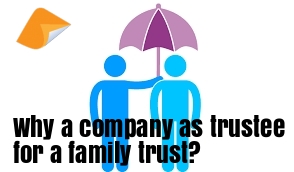
In Australia, a company is commonly built to be a trustee of a Unit Trust or a Family Trust.
E.g. New Comp Pty Ltd as trustee for the Smith Unit Trust
A company used for this purpose is called a ‘corporate trustee’.
1. Press the “Start Building” button and build and pay for the corporate trustee, first
Wait for the company to be incorporated (normally within 15 minutes)
2. Then build and pay for the Unit Trust Deed, second
Build the company (to be trustee of the Unit Trust) first.
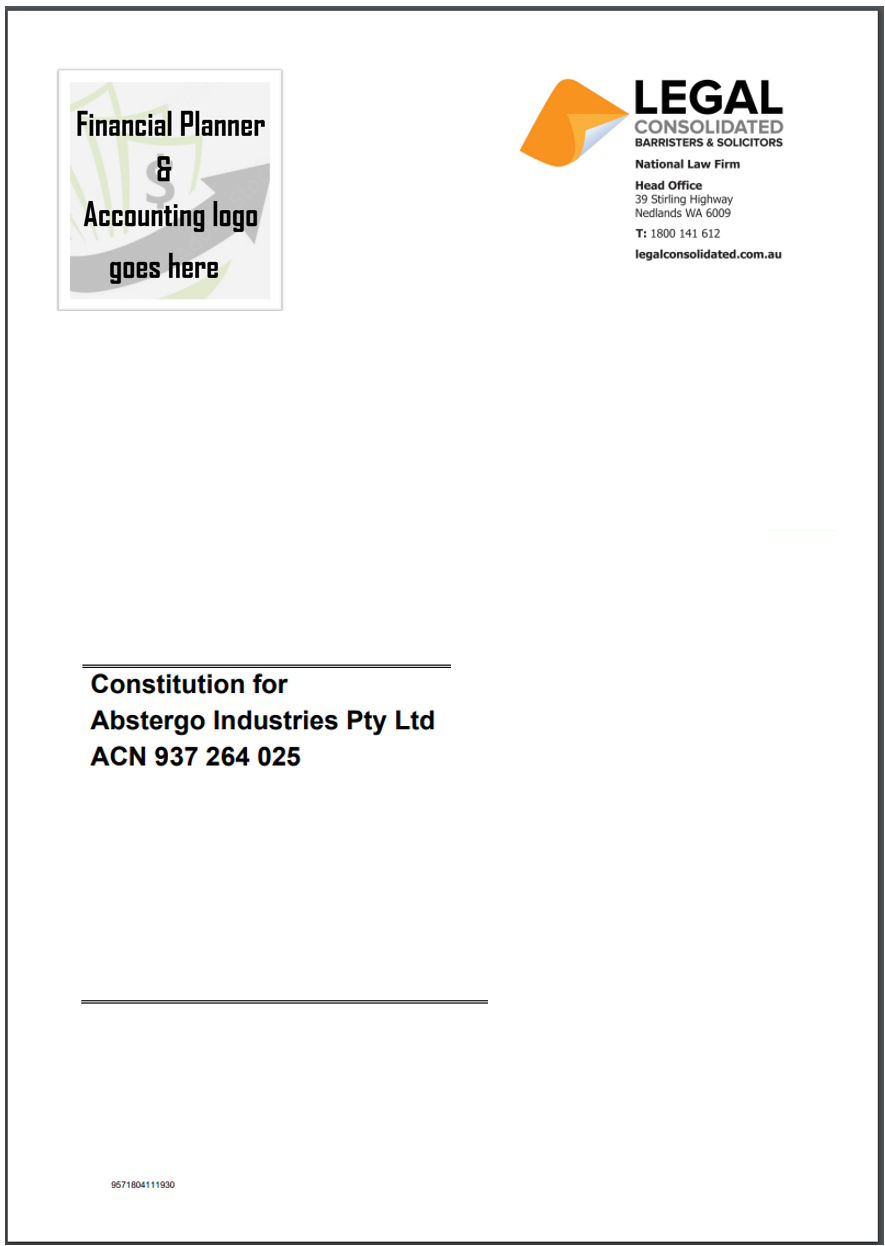
You are welcome to add your logo to our law firm’s documents for free.
- Press the green button at the top of this page: “Start Building“.
- The sole director is the person of straw (has no assets in their name).
- The sole director holds one share worth $1.00 ‘as trustee for the ‘yet-to-be-built’ Unit Trust. Or, if you have a spouse, then the Director holds no share, instead, the Spouse is the one and only Shareholder and holds one share worth $1.00.
- Wait for us, as your lawyers, to check and incorporate the company.
- Once incorporated you now have the
- confirmed name of the company; and
- Australian Company Number (ACN).
- Armed with the company name and ACN you build the Unit Trust Deed.
- On the next day, after you have built the company, now build the Unit Trust Deed on our website.
- The Trustee of the Unit Trust is your new company.
- The Unit Holders are you and your business partners.
Who should own the shares of a corporate trustee?
While the corporate trustee:
- has no assets (other than the $1.00 paid-up capital); and
- can be sacked by the Unit Holders of the Unit Trust anytime
it is still important that each Unit Holder has some interest in the corporate trustee’s shareholding.
Why don’t I need an ABN or TFN for my corporate trustee?
A corporate trustee does not need an Australian Business Number (ABN) or a Tax File Number (TFN). A corporate trustee has neither an ABN nor a TFN. This is because it, itself, does not trade.
The corporate trustee has no ‘beneficial’ interest in the assets it holds for the Unit Trust. The corporate trustee (this is the company you are currently building) merely holds the assets of the ‘true’ owner. This is the Unit Trust.
Therefore, instead, the Unit Trust gets the ABN and TFN.
Why does a Unit Trust corporate trustee not do tax returns?
Similarly, the corporate trustee does not do tax returns. This is because it does not own, beneficially, any assets. For tax purposes, the corporate trustee owns no assets.
Sure, it looks after, as trustee of a Unit Trust, a lot of assets. But it does not ‘beneficially’ own those assets.
Why have a company as trustee of your Unit Trust?
Running a business – any business – is high risk. To reduce that risk you separate the business from the individual as far as you can. One method to do this is to trade through a Unit Trust which has a company as the trustee.
This is called a ‘Unit Trust with a corporate trustee’. It is a low-cost and very effective way of carrying out asset protection. The Unit Trust is a common business structure where more than one family is involved. It is good if you and your friend are going into business together. (If you are setting up a business with just yourself then consider a corporate trustee with a family trust instead.)
Both the Unit Trust and its Trustee are at risk
When starting a unit trust consider the legal risks and liabilities. Often the trustee bears the primary liability for all the liabilities of the trust. Sure, the trustee has a right to indemnity against the assets of the trust. But that is often not sufficient, the unitholders may also be personally liable.
If a trust has individual trustees, their assets are exposed. This includes unforeseen legal liabilities regarding the trust such as where a trustee is sued by someone injured on an unsafe property. This is a compelling reason why all trusts should have a corporate trustee appointed. Indeed, we strongly recommend that a sole-purpose corporate trustee be appointed to limit liability.
There may be instances where a trustee may lose its right of indemnity against trust assets, and the directors become personally liable for liabilities they incur on behalf of the trust.
Are directors of a corporate trustee at a higher risk?
Often a director goes down with their company. But there are ways to reduce that risk.
Sadly, the director’s risk is higher when the company acts as a corporate trustee.
Section 197(1) Corporations Act 2001 deals with a director of a corporate trustee. The director is personally liable if the corporation:
- (a) has not discharged, and cannot discharge, the liability or that part of it;
- (b) is not entitled to be fully indemnified against the liability out of trust assets solely because of one or more of the following:
- (i) a breach of trust by the corporation;
- (ii) the corporation’s acting outside the scope of its powers as trustee;
- (iii) a term of the trust denying, or limiting, the corporation’s right to be indemnified against the liability
The director is liable both individually and jointly with the corporate trustee.
Hanel v O’Neil
The rules changed after Hanel v O’Neil [2003] SASC 409. This case looked at a director of a corporate trustee. There was a right of indemnity under the trust deed. However, the trust has insufficient assets.
Is the right of indemnity sufficient to escape personal liability? This is where the trust fund has insufficient assets.
The Act was amended in 2005. Directors of corporate trustees are better protected. Now, a director is only liable under s197(1)(b) if:
- the corporate trustee acts in breach of trust;
- the company acts outside the scope of its powers as trustee; or
- a term in the trust deed denies or limits the trustee’s right to indemnity.
Also, directors of a corporate trustee are personally liable for the company’s debts:
- by taking on debts that they know the corporate trustee is unable to repay; and
- under certain tax debts where the law imposes direct liability on directors. For example:
- pay as you go (PAYG)
- superannuation guarantee charge (SGC); and
- goods and services tax (GST).
These are from a director penalty notice. When a company fails to pay its PAYG withholding, net GST or SGC liability by the due date, the directors are personally liable.
Buy land before the Company and Unit Trust deed are set up?
You cannot buy real estate or any asset for your Unit Trust until you have built and signed your Unit Trust Deed.
You cannot build your Unit Trust Deed until we have checked and incorporated your new company.
Register your new company on our law firm’s website
We check your company registration. This is before it proceeds to ASIC.
Incorporating a company with ASIC is important.
Our company and constitution comply as:
- a trustee of a unit trust, family trust and bare trust
- a trustee of a Self-Managed Superannuation Fund
- a crowd-sourced funding vehicle
- a vehicle to operate a business, in its own right (That is, not as a trustee)
Restricting your choice of corporate trustee name
As you build your company on our website, check if your preferred company name is available.
You cannot use the words:
- ‘bank’
- ‘trust’
- ‘royal’
- ‘incorporated’
You cannot use words that could mislead people about a company’s activities. This includes links to the Government, the Royal Family, or ex-service person groups.
ASIC refuses offensive and illegal names.
Allowed short forms in company names
and:
Australian Business Number: ABN
Company: Co, Coy
Proprietary: Pty
Australian: Aust
Proprietary Limited: Pty Ltd
Corporate trustee Constitution vs replaceable rules
Companies are governed by:
- a constitution (recommended), or
- replaceable rules
Replaceable rules (from the Corporations Act 2001) provide a basic set of rules for your company. They are not good. Few accountants, lawyers or advisers recommend them.
Replaceable rules are less than the bare minimum. There are many additional powers that a company should have. These are only found in a constitution.
Replaceable rules change at the whim of the current government. While the changes may benefit ‘society’, they may not be in the best interests of shareholders. In contrast, shareholders amend constitutions anytime.
Our corporate trustee ATF unit trust Constitution contains: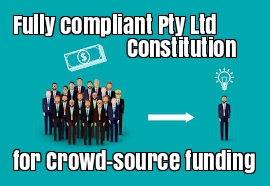
- Adjunct Professor, Dr Brett Davies’ Doctorate was on business succession planning, our pre-emptive rights are cutting-edge
- tag along requirement’ forcing minority shareholders to also sell their shares together with majority shareholders
- accountant-friendly, GAAP-compliant valuation powers
- profit distributions, even when there is no ‘profit’ for ATO purposes
- over 30 different classes of shares
- allowing Directors and shareholders to use Skype and other online facilities
- built-in Division 7A Loan Deeds
Seven advantages of using a law firm website to build your unit trust corporate trustee
The 7 advantages of using Legal Consolidated:
- 94% of incorporations happen within 15 minutes of you building the company online
- our lawyers personally vet the details before submitting them to ASIC
- when required, we contact ASIC to confirm your company name
- what if your company name is unavailable or challenged by ASIC? We contact you via telephone and help you find one that is available
- you receive a secure, personalised email containing
- Certificate of Incorporation
- Company Constitution
- All minutes
- Letter on our law firm’s letterhead
- as always, our hints and training videos guide you. The law firm is available 24/7 via telephone for legal advice on how to build your document
- a constitution is a deed. Only a law firm can legally prepare deeds.
Business Structures for Personal Services Income, tax and asset protection
Family trust v Everett’s assignments
- Family Trust Deed – watch the free training course
- Family Trust Updates:
- Everything – Appointor, Trustee & Deed Update
- Deed ONLY – only update the Deed for tax
- Guardian and Appointor – only update the Guardian & Appointor
- Change the Trustee – change human Trustees and Company Trustees
- The company as Trustee of Family Trust – only for assets protection?
- Bucket Company for Family Trust – tax advantages of a corporate beneficiary
Unit trust vs Everett’s assignments
- Unit Trust
- Unit Trust Vesting Deed – wind up your Unit Trust
- Change Unit Trust Trustee – replace the trustee of your Unit Trust
- Company as Trustee of Unit Trust – how to build a company designed to be a trustee of a Unit Trust
Corporate structures and Everett’s assignments
- Partnership Agreement – but what about joint liability?
- Incorporate an Australian Company – best practice with the Constitution
- Upgrade the old Company Constitution – this is why
- Replace lost Company Constitution – about to get an ATO Audit?
- Independent Contractor Agreement – make sure the person is NOT an employee
- Service Trust Agreement – operate a second business to move income and wealth
- Law firm Service Trust Agreement – how a law firm runs the backend of its practice
- Medical Doctor Service Trust Agreement – complies with all State rules, including New South Wales
- Dentist Service Trust Agreement – how dentists move income to their family
- Engineering Service Trust Agreement – commonly engineers set up the wrong structure
- Accountants Service Trust Agreement – complies with ATO’s new view on the Phillips case
